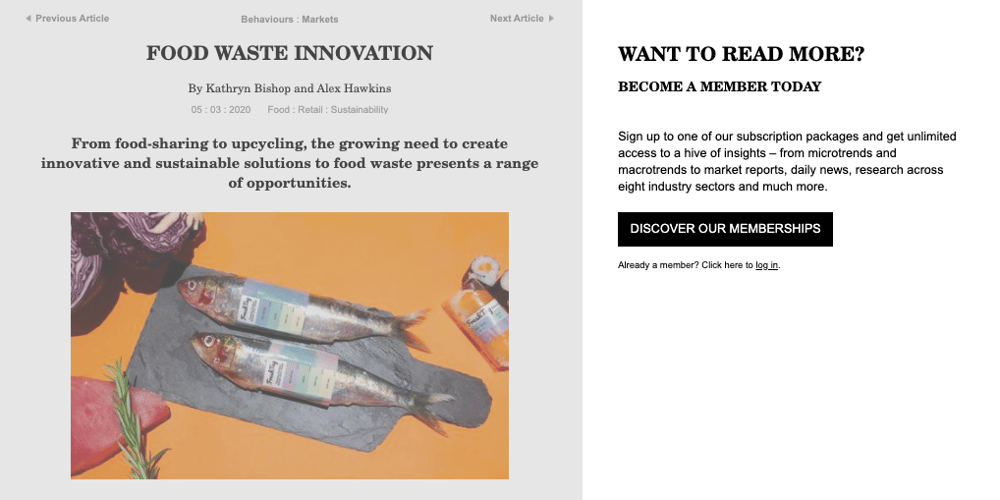Food waste innovation
From food-sharing to upcycling, the growing need to create innovative and sustainable solutions to food waste presents a range of opportunities
In the midst of a global drive towards sustainability, circularity and embracing imperfection, the food sector is taking a proactive approach to food waste management.
‘We obsess about electric cars, coal power stations and plastic bags, but the biggest environmental problem is our food. We need a radical change to the food system,’ says Joost Bakker, a zero-waste pioneer.
Globally, supermarkets are working to positively address their activity relating to food waste. In the UK, more than 100 leading grocers recently signed a pledge to urgently reduce food waste, following a call to action from the UK government.
As a wave of food industry pioneers address waste through new goods and services, innovation is filtering down to the products we put in our shopping baskets.
From shelf to shared fridges
While apps such as Olio have pioneered peer-to-peer sharing of surplus food in consumers’ neighbourhoods, new initiatives are working to tackle food waste at scale by working directly with supermarkets and restaurants.
Northern Ireland’s Gander is an app that delivers real-time updates about locally discounted foods. It has joined forces with Henderson Group, parent company of supermarket chain Spar, allowing consumers to map stores, filter by food type and watch items for reductions in price. ‘We’re not changing our processes at all – stores are still operating a twice-daily price reduction when products near their end date,’ explains Darren Nickels, head of Henderson Technology in Northern Ireland.
Turning attention to restaurants, cafés and bakeries, burgeoning Israeli app SpareEat uses a similar process, putting together boxes of food that people buy through the app, before collecting in a specific time slot.
Breaking out of grocery stores or food vendors entirely, Swedish food waste app Karma has teamed up with Electrolux to pilot a public refrigerator at Stockholm’s central underground station, where the public can conveniently collect reduced-price food items. If successful, Karma hopes to install more fridges in public spaces to make it even easier for consumers to pick up food on their way home.
20 July 2020
Author: Kathryn Bishop & Alex Hawkins
Image: FreshTag by Rui Xu, Royal College of Art
Share
𝕏
Smart freshness supervisors
As explored in Educated Eating, grocers have a responsibility to educate consumers about food sourcing and provenance. Yet, when it comes to freshness, consumers remain conflicted about what’s edible. According to Too Good to Go, 53% of Europeans are reportedly unable to tell the difference between best-before and use-by dates.
‘The way food and drink is packaged, labelled and priced can influence household food waste, and retailers and brands are uniquely placed to help minimise food waste in the home,’ explains Peter Maddox, director at Waste and Resources Action Programme (WRAP). And while more intelligent packaging solutions and Smart Food Storage have emerged, growing awareness about packaging is pushing innovations in ‘naked’ concepts – stickers, second skins and pH-sensitive dyes that preserve and monitor food freshness without traditional packaging.
Stixfresh fruit stickers are like the labels found on bananas and oranges, except they're all-natural and made with a wax that ‘creates a protective layer around your fruit’. According to the company, the stickers help to slow down the natural ripening process, extending freshness by up to 14 days, while also boosting moisture retention.
Apeel Sciences, meanwhile, is responding to the finding that, in the US alone, 40% of all food goes to waste (source: NRDC). It’s innovated a second skin that adds a layer of plant-derived protection to the surface of produce to slow water loss and oxidation – factors that cause spoilage. ‘Fruit and vegetables already have packaging in the form of skins and peels, and Apeel is drawing on what nature already creates to help the industry increase the sustainability of its offerings,’ explains Michelle Masek, communications adviser at Apeel Sciences.
‘Our research shows that people want clear, consistent information to help them keep food fresher for longer’
Peter Maddox, director, WRAPWant to read more?
Become a member today!
Sign up to one of our subscribtion packages and get unlimited access to a hive of insights - from microtrends and macro trends to market reports, daily news, research across eight industry sectors and much more.
Discover our memberships
Already a member? Click here to login

